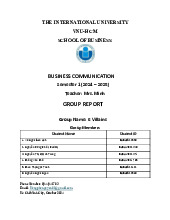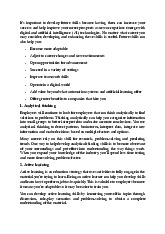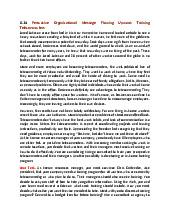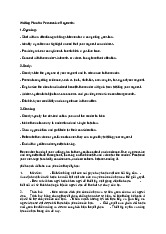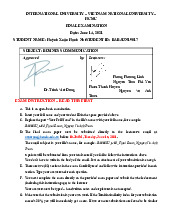



















Preview text:
INTERNATIONAL UNIVERSITY SCHOOL OF BUSINESS
THE IMPACTS OF CELEBRITY
ENDORSEMENT ON CONSUMERS PURCHASING INTENTION
The case of Son Tung MTP endorsing Biti’s Hunter. A thesis proposal Submitted to Mr. Nguyen Van Phuong
School of Business Administration
Name: Pham Huyen Quy Nhi
Student ID: BABAIU14187
Ho Chi Minh City, May, 2018 TABLE OF CONTENTS
CHAPTER I..................................................................................................................................1
INTRODUCTION.......................................................................................................................1 1.1
Background of the study.............................................................................1 1.2
Rationales of the study................................................................................2 1.3
Research Questions and Objectives......................................................2 1.4
Introduction to “Biti’s Vietnam” and endorser “Son Tung
MTP”................................................................................................................................3
1.5 Limitations.........................................................................................................4
CHAPTER II................................................................................................................................5
LITERATURE REVIEW...........................................................................................................5
2.1 Celebrity endorsement................................................................................5 2.1.1
Celebrity......................................................................................................5
2.1.2Celebrity endorsement............................................................................5 2.2
Models on Celebrity Endorsement Strategy......................................6
2.2.1 Source Credibility Model........................................................................7 2.2.2Source
Attractiveness Model................................................................7
2.2.3Meaning Transfer Model..........................................................................8 2.3
Research Hypotheses...................................................................................9
CHAPTER III.............................................................................................................................11
METHODOLOGY.....................................................................................................................11 3.1
Research Design...........................................................................................11
3.1.1Quantitative Method...............................................................................11
3.1.2Questionnaire Design.............................................................................11 3.2 Pilot
Test...........................................................................................................12 3.3
Data Collection...............................................................................................12
3.3.1 Sample size................................................................................................12
3.3.2Sampling collecting.................................................................................13
3.4 Measurement Scale.....................................................................................13
REFERENCES..........................................................................................................................16
APPENDIX................................................................................................................................19 CHAPTER I INTRODUCTION
1.1 Background of the study
Mass media is in its golden age, the utmost goal of advertising is to catch the attention
of the potential consumers and persuade them to place their trust in the image of the
product, result in purchase decision (Belch, 1994). In a market where advertising plays
a vital role in influencing consumer purchases, there is a need for companies to induce
all possible measures to attract customers and leave an impact on their purchasing
intention through an effective advertising campaign.
On the other hand, today society is said to be excited with celebrities (Schickel 1985).
This has led to the thing that more brands are using celebrities to differentiate their
brand and to create a competitive advantage (Ilicic & Webster, 2015). Hence,
nowadays celebrity endorsement has currently been a rising trend as one of the most
popular strategies in the advertising market in order to implement appropriate
promotional campaigns that have an important role in the success of the product in
terms of sales and brand recognition. Theory and practice also proves that the use of
celebrities in advertising creates lots of publicity and immediate attention.
According to a study conducted by Elberse and Verleun (2012), celebrity endorsement
boosts sales by an average of 4% during the adverting campaign or the endorsement period.
Specifically, a research conducted by Nielsen on the impact of advertising in Vietnam
showed that 68% of respondents said that Vietnam commercials increased preference
towards brands they care about (brandvietnam.com). In the
Vietnamese entertainment industry, there are a huge number of popular
advertisement endorsers including Ho Ngoc Ha, Tran Thanh, Thanh Hang, Ha Anh Tuan,
Isaac, Son Tung MTP… for a variety of brands such as smartphone, cosmetics, food and 1
beverage. They are expected to attract attention of audiences, create positive attitudes
towards the advertisements, and thus generate the purchase behavior of customers.
1.2 Rationales of the study
In an era where a wide range of brands is increasing the use of celebrity endorsement,
there is not much work done to the footwear industry, and to be more specific, there
is no data related with the purchasing intentions of Vietnamese consumers. Therefore,
the purpose of this study is to investigate the preferences of viewers towards the
advertising using a celebrity endorser by Biti’s Vietnam, which factors have an impact
on the preferences of viewers towards the advertising, and whether audiences’ favor
of advertising can influence the purchase intention of potential customers within footwear industry.
1.3 Research Questions and Objectives
In order to investigate the preferences of viewers towards the advertising using a
celebrity endorsement, this study will aim to answer these following questions: (1)
Does celebrity endorsement have an impact on viewers’ preferences towards the
advertising; (2) Which characteristics of the celebrity endorser influence the preferences
of viewers towards the advertising; (3) Whether the preference of viewers towards the
advertising motivates their purchase intention; (4) How to improve the performance of
celebrity endorsement to gain consumers’ attention and interest in the advertising and
lead to the intent to purchase.
The research objectives are clearly defined as below:
• To determine the impact of using celebrity endorsement on viewers’
preference towards the advertising.
• To examine which factors of the celebrity endorser affect the preference of
viewers towards the advertising.
• To illustrate the relationship between viewers’ preference towards the
advertising and the purchase intention. 2
• To propose recommendations to boost the performance of celebrity endorsement strategy.
1.4Introduction to “Biti’s Vietnam” and endorser “Son Tung MTP” Binh Tien Imex
Corporation (Biti’s) was established in 1982. Until now, with 36 years of history, Biti’s
strive to be the number one footwear brand in Vietnam which produces and retails its
shoes and owns its prestige through high quality products (bitis.com.vn). Besides being
an outstanding footwear brand, Biti’s also contributes greatly to Vietnam economic development.
In recent years, Biti’s has continually expanded its network of shops nationwide which
provide customers with all type of footwear. Each month, the company introduces
about 40 new products through this distribution network that helps promote the
prevalence of the company’s products in the domestic market (vietnam.vnanet.vn).
At the beginning of 2016, Biti’s Vietnam released their outstanding innovative
products, named “Biti’s Hunter”. It is believed to mark their impressive milestone of
launching the innovative sport shoes manufactured with high technology and
modernized design to catch the attention of the young generation. Biti’s Hunter which
is so far the lightest ones in Vietnam with a weight of 225g (bitis.com.vn). Right after
launching, Biti’s Hunter had managed to drive the society and gain enough popularity.
As the company have made an attempt at changing its perception from being
“outdated” to something trendy and of high quality.
Contributing to the success of Biti’s marketing campaign at that time was the
appearance of their celebrity endorser- Son Tung MTP. Son Tung MTP is one of the
most famous Vietnamese singer; it has been 6 years since his first debut, he is still
making waves amongst the young generation due to all of his catchy songs. At the age
of 23, he has achieved a lot of awards, and has broken some noticeable record.
On January 1, 2017, Son Tung released his music video called 3
“Lac Troi”. This music video had reached a new record in Vietnam after attracting
approximately 5 million viewers on the first day of its release (VNS, 2017). The special
thing about that video is that Son Tung was wearing Biti’s new shoes line- Hunter
during that music video. After the release of that video, the young customers were
madly rush to find the shoes in stores and even online. The result is that Biti’s sold out
all their Hunters in only a week after their smart marketing campaign of having Son
Tung use their new product (vietnam.vnanet.vn).
On June 15, 2017, Son Tung was finally invited to be the endorser of Biti’s, exclusively
Biti’s Hunter product line. From then on, they well corporate into many successful
marketing campaign to enhance the brand image and also boost the sales to maximize
the profit for the company. 1.5Limitations
Advertising music video “Lac Troi” for the product “Biti’s
Hunter” of Biti’s endorsed by Son Tung MTP hit the record in Vietnam of attracting
nearly 5 million viewers on the first day of its release, which means that it had reached
a huge number of people around Vietnam (vietnamnet.vn). However, due to the
geographical constraint, the research is only conducted in Ho Chi Minh City and young
people are the main respondents as Biti’s Hunter’s brand positioning. CHAPTER II LITERATURE REVIEW
2.1 Celebrity endorsement 2.1.1 Celebrity
Mass media is in its golden age, and today’s society is said to be excited with
celebrities (Schickel, 1985). Specifically, celebrities are those people who have been
well- known by the large number of people for their uniqueness and some special
traits including intelligence, beauty, charisma or sophistication (Schlecht, 2003). 4
Hence, more brands are using celebrities as an attractive tool of advertising (McCracken, 1989).
2.1.2Celebrity endorsement
Due to the era of dynamic and highly competitive business environment, the use of
celebrities as spokespersons is becoming an increasingly common strategy in the
advertising industry. They are known as the term “celebrity endorsement”. McCracken
(1989) described that term as “any individual who enjoys public recognition and who
uses this recognition on behalf of a consumer good by appearing with it in an
advertisement”. They have high public recognition and have powerful influence upon
endorsing products. Therefore, marketers are in need of using different personalities
to relate with their brands to create unique identity of the brand, and also to maximize
the company’s profit. Since those people are involved in communicating the marketing
message in either a direct or indirect manner, they are seen as the source (Belch &
Belch, 1995). Friedman tested four types of endorsers: celebrity, CEO, expert and,
typical consumer and identified that amongst those four types, the celebrity endorser
reached the highest score on dimensions such as trustworthiness, believability,
persuasiveness, and likeability. Simply, celebrities accomplish a high level of attention
and recall. They represent the firm to appear on media to bring information of the
advertised product, share their experiences and influence the audience. Also, a study
of Alsmadi (2006) stated that consumers had a tendency to pay more attention on
celebrity advertisement.
As in Erdogan (1999) literature review, there are a range of factors affecting the
effectiveness of celebrity endorsement such as reliability and attractiveness of the
celebrity, the congruence between the celebrity and the product endorsed, the firm’s
message conveyed by the endorser and the involvement with the products.
The one key to the effectiveness of celebrity endorsement is the congruence between
the type of endorser in the advertising campaign and the type of product being
endorsed (Friedman, 1978 and Atkin and Block, 1983). That conformity between those 5
two regarding some characteristic such as image, expertise or attractiveness plays an
important role for the effectiveness of the advertisement, because they are the one
who transfer the message to the consumers. As McCracken (1989) stated that using
celebrity endorsement is a productive way of transferring meaning to brands.
Moreover, consumers have a belief that sources of information about the endorsed
products given by those famous people are credible (Goldsmith et al. 2000). According
to Ohanian (1990), credibility shows the positive characteristics of a contributor, which
has an impact on the acceptance of the message. Before making any further moves in
using the celebrity endorsement, marketers are in need of measuring the degree of
that person’s credibility in order to evaluate the possible impact of using such individuals.
2.2 Models on Celebrity Endorsement Strategy
One of the most challenging tasks for the marketers is to select the appropriate
celebrity to endorse the product. This section will present some relevant models that
explain which necessary attributes a celebrity should have in order to fulfill the need
of the brands. Carl Hovland and his associates introduced one of the very first models
in 1953 called the Source Credibility Model. After that, two additional models were
developed, which are the Source Attractiveness model (McGuire 1985), and the
Meaning Transfer Model (McCracken 1989).
2.2.1 Source Credibility Model
It is reported that some advertising research suggests that approximately 70 percent of
consumers think that advertising is untruthful (Calfee and Ringold, 1994). Hence, one
of the most outstanding reason why marketers should use celebrity as spokespeople is
to make the conveyed message more credible. The source credibility model illustrates
the effectiveness of a message delivered by the endorser which depends on the
perceived level of expertise and trustworthiness of that endorser (Dholakia and
Stemthal, 1977; Hovland, et al. 1953; Hovland and Weiss, 1951; Ohanian 1991; 6
Solomon 1996). An endorser, who has the key credibility source factors, is believed to
increase the purchase intention of the consumer (Liu et al. 2017) and also leave an
impact on their beliefs, opinions, attitudes and behaviors.
B. Zafer Erdogan (1999) stated that trustworthiness clarifies the honesty, integrity and
believability of an endorser. Expertise is defined as “the extent to which a
communicator is perceived to be a source of valid assertions” referring to knowledge,
experiences or skills possessed by an endorser (Hovland et al. 1953). Ohanian (1991)
stated that celebrity endorser is likely to generate more purchase intentions.
Specifically, consumers get higher brand recognition when the celebrity is an expert in
the field and the more expertise a celebrity got the higher the effectiveness (Amos,
Holmes & Strutton, 2008). In addition to trustworthiness and expertise, the
attractiveness of the endorser can enhance the effect of the message conveyed
(Canning and West, n.d). Hence, expertise, trustworthiness, and attractiveness are
considered to be the components of source credibility.
2.2.2Source Attractiveness Model
Due to previous researches mentioned by Erdogan (1999), consumers have a tendency
to respond positively to physically attractive people. Moreover, research has shown
that spokespeople are more likely to change consumers’ beliefs if they are physically
attractive than unattractive. Besides, McGuire (1985) contended that the effectiveness
of a message is highly depending on similarity, familiarity and liking for the endorser.
Similarity refers to the resemblance between the source and message receiver, while
familiarity refers to the recognition of the source by message receiver. Likeability is
defined as “the affection for the source as the result of physical appearance and
behavior” by Erdogan (1999).
2.2.3Meaning Transfer Model
McCracken (1989) has made up a meaning transfer model applying to celebrity
endorsement. This model illustrates a process of transferring the image of celebrity 7
endorsers to the advertised brand and is divided into three stages as illustrated in
figure 1.1: culture, endorsement and consumption.
Figure 1.1: The Meaning Transfer Model (Source: McCracken 1989)
In other words, the first stage is the formation of celebrity’s image; the second stage
is the transfer of meaning from celebrity to product and the last stage is the transfer
of meaning from product to consumers.
In the first stage- culture, a wide range of features are being evaluated and
considered by the advertisers to finalize what type of celebrity perfectly fit into the
endorsed products and the firm’s culture. Next, the meaning of the celebrity is
transferred into the product during stage 2. The message conveyed by the celebrity
must match with the message of the product. Last, the meaning is transferred from
the product to the consumer to complete this meaning transfer strategy. Therefore, 8
the effectiveness of celebrity endorsement strategy depends on the meaning that the
celebrity transfers through the endorsement process.
2.3 Research Hypotheses
Amos, Holmes, and Strutton (2008) have conducted a study about the relationship
between celebrity endorsement and advertising effectiveness. The research was done
based on the measurement of 9 elements including: (1) Performance, (2) Negative
celebrity information, (3) Credibility, (4) Expertise,
(5) Trustworthiness,
(6) Attractiveness, (7) Likeability, (8) Familiarity, and (9) Celebrity/ Product Fit.
This research aims at investigating which attributes have an impact on viewers’
preference towards advertising and customer purchase intention for Biti’s Hunter. The
study will apply the model of Amos, Holmes, and Strutton (2008) to examine seven
main independent variables.
This table makes an overview on the research hypotheses of this study. H1
Endorser’s attractiveness has a positive impact on viewers’ preference towards the advertising. H2
Endorser’s expertise has a positive impact on viewers’ preference towards the advertising. H3
Endorser’s trustworthiness has a positive impact on viewers’ preference towards the advertising. H4
Endorser’s familiarity has a positive impact on viewers’ preference towards the advertising. H5
Endorser’s performance has a positive impact on viewers’ preference towards the advertising. H6
Endorser’s likeability has a positive impact on viewers’ preference towards the advertising. 9 H7
Celebrity/ Product fit has a positive impact on viewers’ preference towards the advertising. H8
Viewers’ preferences towards the advertising have a positive impact on consumers purchase intention.
This set of hypotheses are grouped together into a type a conceptual framework. intention CHAPTER III METHODOLOGY 3.1 Research Design 10
3.1.1Quantitative Method
This research aims at investigating the impact of attributes of celebrity
endorsement on the viewers’ preference towards the advertising and customer
purchase intention toward Biti’s Hunter. This study is made to approach a large
number of Vietnamese consumers by questionnaire surveys. Hence, by all means,
quantitative method is greatly applied as a descriptive approach. Moreover, this
study also concentrates on testing hypotheses obtaining from the adapted
theoretical model by Amos, Gary Holmes, and David Strutton (2008), which
examines the influence of celebrity endorsement on viewers’ preference and
customer purchase intention on a specific product – Biti’s Hunter.
3.1.2Questionnaire Design
The questionnaire is designed in two ways: online surveys delivered by mail or
other social networks and handout surveys. Besides, there are two versions of the
questionnaire, Vietnamese and English. All the questions are ensured to address
the tested hypotheses, and appropriate wording with simple and direct
vocabulary, no loading or double- barreled questions. Additionally, the
questionnaire must follow a smooth and logical flow from one topic to the next.
The questionnaire is classified into three main parts including general information,
detailed information and respondents’ demographic information.
• Part 1: General information
This is the part to determine whether the respondents have known about the
advertising music video of Son Tung for Biti’s Hunter to further the survey.
• Part 2: Detailed information
This main part is to investigate which attributes have an impact on viewers’
preferences as well as their purchase intention regarding the use of Son Tung as
Biti’s Hunter’s celebrity endorsement. 11
Most of the questions in this part are designed with the Likert scale. According to
Cooper et al. (2006), the Likert scale, is the most frequently used variation of the
summated rating scales. It requires the respondents to point out the degree of
agreement or disagreement with a variety of statements related to the attitude
object. Specifically, in this questionnaire, the 5- point Likert scale is adopted as the
main measurement scale including (1) Strongly disagree, (2) Disagree, (3) Neutral,
(4) Agree and
(5) Strongly agree.
Part 3: Respondents’ demographic information This final part is designed to
gather the personal information of targeted respondents involving their gender,
age, occupation and monthly income. 3.2 Pilot Test
Pre-test design is well conducted to examine the feasibility of the structure as well
as the questionnaire. The questionnaire will be sent to a small amount of 30
targeted respondents to evaluate the questions on the basis of comprehensibility
and the ability of the respondent to fully understand and respond to the questions
with not confusion. Afterwards, the results and feedbacks are collected to improve
the quality of the questionnaire such as the ambiguous ones are adjusted in order
to enhance the feasibility of the survey. 3.3 Data Collection 3.3.1 Sample size
The sample that will be used in this research mainly fall in
Vietnamese young consumers who is living in Ho Chi Minh City and have watched
Son Tung MTP advertising music video about the product Biti’s Hunter and have an
intention to purchase them. A sample size of 300 respondents is taken for the
study. Sekaran (2003) stated that sample size which is larger than 30 and less than
500 are appropriate for most researches, so the sample size used in this study can
be considered as appropriate. 12
3. 3.2Sampling collecting
The survey is designed in two forms: online survey and offline survey. The former is
delivered to the respondents by sending out the survey link which can be gotten
access to on their electronic devices. The reason to use this tool is that
respondents can be reached easier via online questionnaire and they will have less
time pressure to answer the questions. The latter one is delivered to the
respondents in the form of handout survey paper. After filling in all the questions,
papers are collected to analyze the data. 3.4 Measurement Scale
Ohanian (1990) developed a list of 139 adjectives related to source credibility,
which was believed to measure celebrity endorsers’ perceived credibility. Later on,
those adjectives were reduced to a more manageable list under three main
constructs: Expertise, Attractiveness and Trustworthiness. Together with the
Source Attractiveness Model and the Meaning Transfer Model, this study
concludes 7 independent variables. Each of the variable is measured by the 5-point
Likert scale. According to Cooper et al. (2006), the Likert scale, is the most
frequently used variation of the summated rating scales. It requires the
respondents to point out the degree of agreement or disagreement with a variety
of statements related to the attitude object. Specifically, in this questionnaire, the
5- point Likert scale is adopted as the main measurement scale including (1)
Strongly disagree, (2) Disagree, (3) Neutral, (4) Agree and (5) Strongly agree. This
measurement is also applied to measure the dependent variable- viewers’
preference towards the advertising and purchasing intentions. Variable
1. Attractiveness (4 items)
• Son Tung is an attractive singer.
• Son Tung is classy.
• Son Tung is handsome.
• Son Tung is elegant. 13 2. Expertise (4 items)
• Son Tung has experience in footwear industry.
• Son Tung frequently takes part in events sponsored by Biti’s to promote Biti’s Hunter.
• Son Tung is qualified for endorsing Biti’s Hunter.
• Son Tung has knowledge about Biti’s products.
3. Trustworthiness (5 items)
• Son Tung is a sincere and friendly person.
• Son Tung is honest.
• Son Tung has a reliable image.
• I think the information about the product endorsed by Son Tung is reliable.
• I trust the product endorsed by Son Tung.
4. Familiarity (5 items)
• I am familiar with Son Tung’s image.
• I think that Son Tung is familiar with young viewers.
• I am getting used to the presence of Son Tung in Biti’s Hunter advertising.
• I am familiar with events hosted by Biti’s that have the presence of Son Tung.
5. Performance (5 items)
• Son Tung is a talented singer.
• I think that Son Tung has a professional performance skill.
• I think that events with the presence of Son Tung always get the positive
response form young audiences.
• Son Tung is successful in his own career.
• Son Tung has gained a strong foothold in Vietnam entertainment industry.
6. Likeability (5 items)
• I am impressed by Son Tung’s lifestyle.
• Son Tung is my favorite singer.
• I think Son Tung is favored by the majority of young viewers.
• I really admire Son Tung. 14
• I like Son Tung’s image in his advertising music video promoting Biti’s Hunter.
7. Celebrity/Product Fit (5 items)
• Son Tung’s image is congruent with Biti’s Hunter product.
• Son Tung’s image fits the target customers of Biti’s Hunter.
• Son Tung’s image is congruent with the message of his Biti’s Hunter
advertising music video.
• Son Tung’s style fits the content of Biti’s Hunter advertising music video.
• I think Son Tung is a suitable endorser for Biti’s Hunter.
8. Viewers’ preference towards the advertising (5 items)
• Biti’s Hunter’s advertising music video is interesting.
• Biti’s Hunter’s afvertising music video has beautiful and vivid images.
• I like the music of that advertising music video.
• I like the acting of Son Tung in his advertising music video for Biti’s Hunter.
• In general, I like Biti’s Hunter advertising music video of Son Tung as an endorser.
9. Purchase Intention (4 items)
• After watching the advertising, I will consider buying Biti’s Hunter shoes.
• After watching the advertising, I want to try Biti’s Hunter shoes.
• After watching the advertising, I become interested in buying Biti’s Hunter shoes.
• After watching the advertising, I have the intent to purchase and use Biti’s Hunter shoes. REFERENCES
Amos, C., Holmes, G., & Strutton, D. (2008). Exploring the relationship between celebrity
endorser effects and advertising effectiveness. International Journal of
Advertising, 27, 209– 234.
Belch, George & Belch, Michael A. (2001). Advertising and Promotion: An Integrated Marketing
Communications Perspective. Boston: McGraw-Hill. 15
Biti’s- The Pride of a Vietnamese Footwear Brand. Retrieved from Vietnambaoanh:
https://vietnam.vnanet.vn/english/bitis-the-prideof-a-vietnamese-footwear- brand/263236.html
Biti’s Back on The Hunt. Retrieved from Maad Gurus: http://vietnamnews.vn/life-
style/349067/pop-idols-music-video-sees5-million-youtube-hits-after-one-
day.html#FzayoIwiIp1zIUXA.97
Chiến thắng của Biti’s Hunter từ 2 MV Sơn Tùng MTP & Soobin
Hoàng Sơn: Hiệu quả gấp 10 lần Coca Cola, Pepsi, lượng bán tăng 3 lần, giày bán sạch trong 1
tuần. Retrieved from Cafef:
http://cafef.vn/chien-thang-cua-bitis-hunter-tu-2-mv-son-tung-mtpsoobin-hoang-son-hieu-
qua-gap-10-lan-cocacola-pepsi-luong-bantang-3-lan-giay-ban-sach-trong-1-tuan- 20171113155420982.chn
Dholakia, R and Stemthal, B. (1977). Highly Credible Source: Persuasive Facilitator or
Persuasive Liabilities? Journal of Consumer Research, 3, No.4, pp.223-232.
Elberse, A., and J. Verleun. (2012). The Economic Value of Celebrity Endorsements. Journal of
Advertising Research, 52 (2): 149–165.
Erdogan, B.Z. (1999) Celebrity endorsement: a literature review. Journal of Marketing
Management, 15 (3), pp. 291–314.
Friedman, H. H., & Friedman, L. (1979). Endorser effectiveness by product type. Journal of
Advertising Research, 19, 63–71.
Goldsmith, R., Lafferty, B. & Newell, S. (2000) The impact of corporate credibility and celebrity
credibility on consumer reaction to advertisements and brands. Journal of Advertising, 29 (3), pp. 43– 54.
Hovland, Carl I., Janis, L. Irving, and Kelley, Harold H. (1953), Communication and Persuasion,
New Haven, CI': Yale University Press.
McCracken, G. (1989). Who is the celebrity endorser? Cultural foundations of the celebrity
endorsement process. Journal of Consumer Research, 16, 10–12. 16
McGuire, W.J. (1985). Attitudes and attitude change. Handbook of Social Psychology, 2, 233- 346.
Ohanian, R. (1990). Construction and validation of a scale to measure celebrity endorsers’
perceived expertise, trustworthiness, and attractiveness. Journal of Advertising, 19 (3), 39-52.
Ohanian, R. (1991). The impact of celebrity spokespersons’ perceived image on consumers’
intention to purchase. Journal of Advertising Research, 31(1), 46-54.
Pop Idol’s music video sees 5 million YouTube hits after one day. Retrieved from
Vietnamnews: http://vietnamnews.vn/lifestyle/349067/pop-idols-music-video-sees-5-
million-youtube-hitsafter-one-day.html#FzayoIwiIp1zIUXA.97
Solomon, Michael R (1996), Consumer Behavior (3rd Edition). London: Prentice- Hall International, Inc.
Spears, N., & Singh, S. N. (2004). Measuring Attitude toward the brand and purchase
intentions. Journal of Current Issues and Research in Advertising, 26 (2), 53-66.
Till, B. D., & Busler, M. (2000). The match-up hypothesis: Physical attractiveness, expertise and
the role of fit and brand attitude, purchase intent and brand beliefs. Journal of Advertising,
29, 1–13. APPENDIX
QUESTIONNAIRE (VIETNAMESE)
KHẢO SÁT TÁC ĐỘNG CỦA VIỆC SỬ DỤNG HÌNH ẢNH NGƯỜI 17
NỔI TIẾNG ĐẾN SỰ YÊU THÍCH CỦA KHÁN GIẢ DÀNH CHO
QUẢNG CÁO VÀ Ý ĐỊNH MUA HÀNG CỦA KHÁCH HÀNG- Trường hợp của ca sĩ Sơn
Tùng MTP quảng cáo sản phẩm
Biti’s Hunter trong sản phẩm âm nhạc
PHẦN 1: CÂU HỎI CHUNG
1.Anh/Chị đã từng xem qua hoặc biết đến sản phẩm Biti’s Hunter thông qua
sản phẩm âm nhạc của ca sĩ nổi tiếng qua truyền hình, báo chí hay Internet chưa? • Rồi
• Chưa (Nếu chọn “Chưa”, anh/chị vui lòng dừng khảo sát tại
đây. Xin chân thành cảm ơn sự giúp đỡ của anh/chị)
2.Anh/Chị có bao giờ thấy những hình ảnh quảng cáo dưới đây của thương
hiệu Biti’s cho sản phẩm Biti’s Hunter chưa?
PHẦN 2: CÂU HỎI CHI TIẾT
3.Anh/Chị vui lòng cho biết ý kiến của anh/chị đối với nhận định dưới đây về ca
sĩ Sơn Tùng MTP trong sản phẩm âm nhạc quảng cáo sản phẩm Biti’s Hunter
của thương hiệu Biti’s Vietnam.
1-Hoàn toàn đồng ý 2- Không đồng ý 3- Trung lập
4- Đồng ý 5- Hoàn toàn đồng ý 18
